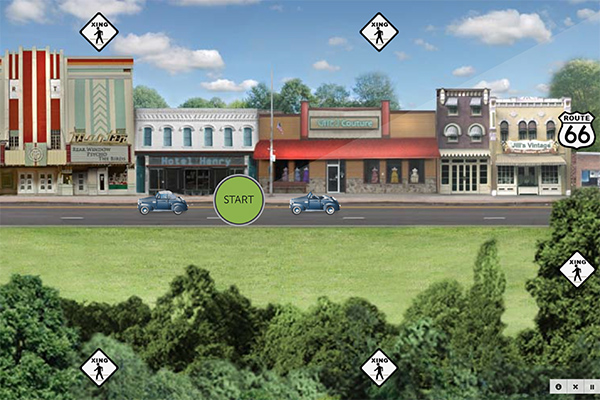Older adults who completed 11 or more sessions of training had a 48 percent reduced risk of dementia over the 10-year study period, a University of South Florida researcher finds
TAMPA, Fla. (July 25, 2016) – A particular type of brain training can significantly and substantially reduce risk for dementia, said University of South Florida (USF) associate professor Jerri Edwards, PhD, in a presentation made yesterday in Toronto, Canada, at the Alzheimer’s Association International Conference.
“This is the first time a cognitive intervention has been shown to protect against dementia in a large, randomized, controlled trial,” said Dr. Edwards, a faculty member in the USF School of Aging Studies and an associate member of the USF Health Byrd Alzheimer’s Institute. “Relatively small amounts of training resulted in up to a 48 percent decrease in the risk of dementia over the 10-year study period.”
Dr. Edwards reported on the latest results from the Advanced Cognitive Training for Independent and Vital Elderly (ACTIVE) study, a 10-year study on cognition and aging funded by the National Institute on Aging.

Jerri Edwards, PhD, an associate professor at the USF School of Aging Studies and associate member of the USF Health Byrd Alzheimer’s Institute, studies cognitive performance, including how quickly the brain can process information and act on it.
The ACTIVE Study enrolled 2,802 healthy older adults at six sites around the United States, and randomized the participants into four groups: 1) an intervention group receiving 10 one-hour sessions of classroom instruction on memory strategies; 2) an intervention group receiving the same amount of instruction on reasoning strategies; 3) an intervention group receiving the same amount of computerized brain training, involving perceptual practice and; 4) a control group measured at the same times as the intervention groups.
All participants were assessed on a number of cognitive and functional measures at the completion of the initial 10 sessions of training (after five weeks) and at follow-up visits at years one, two, three, five and 10. Subsets of each intervention group also received four additional “booster” training sessions at years one and three. In releasing the current results, the researchers looked at the risk of developing dementia over the 10-year period across all four groups.
Researchers found no significant difference in risk of dementia for the strategy-based memory or reasoning training groups as compared to the control group. However, as compared to the control group, the computerized brain training group were 33 less likely to develop dementia across 10 years, a statistically significant difference (p=0.012).
The researchers further saw a significant dose-response function. After adjusting for other variables indicating risk for dementia (e.g., race, sex, mental status, physical status, depressive symptoms), participants who engaged in 11 or more sessions of the computerized brain training showed a 48 percent reduction risk of dementia as compared to the control group (p=.005).
Participants in the computerized brain training group were trained on a highly specific task designed to improve the speed and accuracy of visual attention, including both divided and selective attention exercises. To perform the divided attention training task, a user identifies an object at the center (i.e., car or truck) of gaze while at the same time locating a target in the periphery (i.e., car). As the user gets the answers correct, the speed of presentation becomes progressively briefer, while the targets become more similar. In the more difficult training tasks, the target in the periphery is obscured by distracting objects, engaging selective attention.

A brain training exercise like that found on BrainHQ.com pushes a user to progressively improve visual speed of processing, with attentional demands both at the center of gaze and periphery.
There is substantial prior scientific literature on this training exercise, which is referred to as “speed of processing training”, “useful field of view training”, or “UFOV training.” The exercise was developed by Dr. Karlene Ball of the University of Alabama Birmingham and Dr. Dan Roenker of Western Kentucky University. It is now exclusively licensed to Posit Science Corporation, and is available as the “Double Decision” exercise of the BrainHQ.com brain training program.
Dr. Edwards noted that this particular training regimen has previously been shown effective in multiple clinical trials and, unlike other approaches, has been found to improve the everyday functional abilities of older adults. “These new data”, she said, “further demonstrate the longitudinal benefit of reducing risk of dementia.”
The benefits of the program are believed to be driven by engaging brain plasticity in a way that improves attention and up-regulates the chemical (neuromodulatory) system.
“We need to further delineate what makes some computerized cognitive training effective, while other types are not,” Dr. Edwards said. “We also need to investigate what is the appropriate amount of training to get the best results, Given that 10 to 14 sessions had these benefits, what would the effects of larger doses be? “
“Clearly, the time spent on effective brain training has potential long-lasting benefits for many aspects of older adults’ lives,” she concluded.
###
The University of South Florida is a high-impact, global research university dedicated to student success. USF is a Top 50 research university among both public and private institutions nationwide in total research expenditures, according to the National Science Foundation. Serving nearly 48,000 students, the USF System has an annual budget of $1.5 billion and an annual economic impact of $4.4 billion. USF is a member of the American Athletic Conference.
Media contact:
Shani Fails, M.A., Director, Communications & Marketing
USF Health Byrd Alzheimer’s Institute
sfails@health.usf.edu or 813-396-0675
